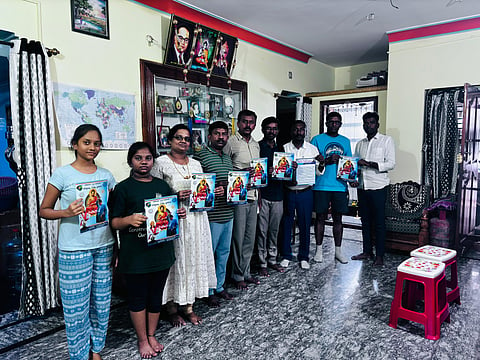
Bengaluru- On June 2, approximately 500 Dalit families in Anekal, Bangalore district, will embrace Buddhism in a significant event marking a resurgence of Buddhist values among the Dalit community.
This mass conversion comes as a response to the declining number of Buddhists in Karnataka over the past two decades and is organized by various Ambedkarite organizations.
The conversion ceremony will take place at Dr. B. R. Ambedkar Maidan in Sarjapur town. Preparations are in full swing, with volunteers distributing leaflets door-to-door to ensure maximum participation and awareness.
Anand Chakravarty, the program coordinator, shared with The Mooknayak that around 3000 people are expected to abandon Hinduism and adopt Buddhism during the grand ceremony.
The event is supported by several Ambedkarite organizations, including the Ambedkar School of Thought, Samata Sainik Dal, Neelam Cultural Center, Bhima Book Bank, Phule Civils Academy, and Ambedkar Study Circle. These organizations have been actively conducting awareness programs across various districts and villages in Karnataka to promote this transformation.
Anand highlighted that these Dalit organizations conduct ongoing awareness initiatives, offering tuition care, career guidance, and social awareness camps for women, youth, and activists. These efforts aim to foster social empowerment and equality within the community.
On October 14, 1956, Dr. B. R. Ambedkar, along with approximately 600,000 followers, converted to Buddhism at Deekshabhoomi in Nagpur. This mass conversion was a radical assertion of identity and a rejection of the oppressive caste system that had plagued Indian society for centuries. Ambedkar's conversion was not just a religious act but also a philosophical commitment to equality, compassion, and social justice.
Babasaheb viewed Buddhism as a powerful tool for the empowerment of the oppressed, offering a path to self-realization and respect, irrespective of caste or social status.
His conversion inspired a wave of social awakening across India, challenging entrenched notions of hierarchy and discrimination.
"All Dalit organizations have united to adopt Buddhism as shown by our leader Babasaheb to escape the vicious cycle of the deteriorating caste system," Anand explained. The voluntary conversion of around 500 families, with 3000 supporters joining them, marks a significant step towards embracing Buddhist values and rejecting caste-based discrimination.
During the ceremony on June 2, the families converting to Buddhism will pledge to follow Babasaheb's 22 vows. These vows include treating everyone with equality, compassion, and fraternity, adopting a scientific approach to life, and living without intoxicants and ostentation.
This commitment symbolizes their dedication to living a life free from the inequalities and discriminations of Hinduism.
After conversion, the neo-Buddhists will abandon Hindu customs, festivals, beliefs, and rituals. Instead of traditional Bhajan Kirtan, Buddha Vandana will resonate in their communities, marking a significant cultural and spiritual shift.
The mass conversion to Buddhism on June 2 marks a turning point, reflecting a continued struggle for social justice and equality. It echoes Ambedkar's legacy, providing the Dalit community with a framework for reclaiming their dignity and rights. This historic event symbolizes the ongoing fight against caste-based oppression and the pursuit of a more just and equitable society.
The Buddhist population in India is approximately 8.44 million, with around 3.6 million residing in urban areas and about 4.8 million in rural areas. The state with the highest Buddhist population is Maharashtra, home to 6.5 million Buddhists.
This is followed by West Bengal with 0.28 million, Madhya Pradesh with 0.21 million, Uttar Pradesh with 0.2 million, Sikkim and Arunachal Pradesh each with 0.16 million, Tripura with 0.12 million, and Jammu and Kashmir with 0.11 million.
Karnataka has a total Buddhist population of 0.097 million, according to the 2011 Census reports by the Government of India.
As per a research report published in 2022 , Karnataka recorded a significant decline of 76.4% in its Buddhist population between 2001 and 2011, dropping from 393,300 to 95,710. This contrasts sharply with the previous decade, 1991 to 2001, which saw a dramatic increase of 439% in the Buddhist population, rising from 73,012 to 393,300. According to the 2011 Census, the Buddhist population has declined by approximately 76% since 2001.
The reasons for this sharp decline are multifaceted and retrospective. In 1989, under Prime Minister V.P. Singh, a committee was formed to amend the constitution to include converted Buddhists under the Scheduled Castes (SC) category for internal reservation. However, no substantial progress has been made in this direction.
The proposal was to grant converted Buddhists the status of Scheduled Caste Buddhists by adding them to the current list of 101 Scheduled Castes in Karnataka. Since this provision has not been implemented, converted Buddhists do not receive caste certificates, leaving them without the benefits of reservations available to SCs and Scheduled Tribes (STs).
This lack of official recognition and associated benefits has led many converted Buddhists to remain within the Hindu system to access SC/ST reservation benefits.
Additionally, converted Buddhists are not eligible for the 4% reservation allocated to Religious Minority communities in India. They find themselves in a twilight zone, unable to access reservations under either the SC/ST category or as a religious minority.
Compounding the issue, caste certificate issuing authorities, typically Tahsildars at the Tehsil level, often deny certificates to converted Buddhists due to inconsistencies and lack of clarity in the issuing process. This bureaucratic hurdle further discourages conversions and contributes to the decline in the Buddhist population in Karnataka.
You can also join our WhatsApp group to get premium and selected news of The Mooknayak on WhatsApp. Click here to join the WhatsApp group.